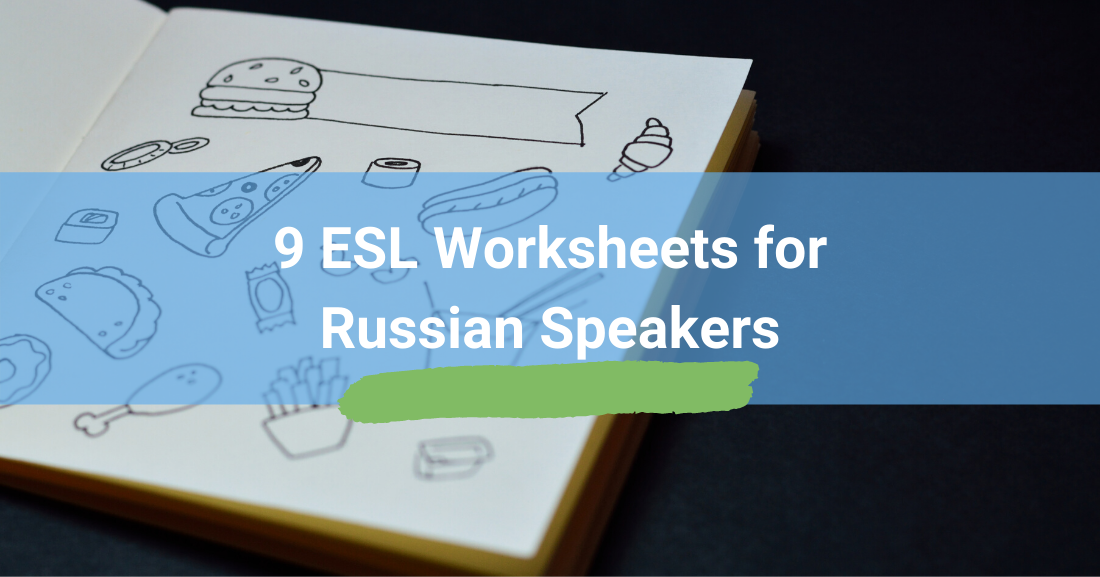Whether you speak the langauge or not, teaching students from different cultures and countries has its fair share of challenges, along with its benefits! In this post, we'll go over how to use ESL resources and worksheets for Russian speaking student. From teaching them American slang to verb tenses to descriptors, these activities will make ESL for Russian speakers fun, easy, and memorable.
ESL for Russian Speakers (RU Speaker Worksheets)
-
1
- All cultures have their own slang, but American slang is used throughout the entire world, so it's important to introduce some conversational vocabularly to Russian speakers as they begin to learn the ropes of the English language. This worksheet covers topics like food and drink, feelings and emotions, physical appearance, character, communication, and travel time. It shows the English word, its pronunciation, and how it's used in a sentence. There is also the Russian definition. The resource can be passed out for students to use as extra practice or broken up into study cards.
-
2
-
Learning tenses is one of the more challenging tasks of learning a language. In seven colorful, engaging slides, this Powerpoint explains the structure of present tense. However, it is written in Russian, teachers that do not speak the language may wish to give it to their students for a reference, or it can be used for parents to teach their students the basics at home.
-
3
- Children are asked question every single day about themselves, and this worksheet will help them be able to answer them in English! The Questions Drill lists more than 30 simple topics for students to create questions from, like their name to their address to their best friend's name. For example, if the box says "weather," the student will need to come up with a question like "how is the weather today?" Students can also color the worksheet and cut out the indiviudal boxes or columns.
-
4
-
If you plan to teach possessive case and sentence structure at any point this year, you need to download this Powerpoint. It's written in Russian to make it easy for beginner ESL students to understand, but there are English examples included as well. After a quick explanation on the first two slides, the Powerpoint includes an engaging practice test, where students are asked to translate the Russian phrase into English using the possessive form.
-
5
-
If you have more advanced ESL students, this worksheet is a great resource to practice colloquial expressive forms. There are phrases written in Russian with its English counterparts, so this resource can be used for multiple activities. You may wish to create flashcards with the Russian translation on one side and the English on the other. Or, you can use it as a speaking activity where the student must translate the Russian phrase and cross-check themselves with the worksheet.
-
6
-
Searching for ways to teach verb tenses to your Russian ESL students? This table clearly outlines the differences between present tense forms, including indefinite, continuous, present perfect, and present perfect continuous. The explanations are in Russian to make learning the subjects easier for students, but the examples are in English so students can get a tangible idea of how to use each tense.
-
7
Comparative and Superlative Adjectives with Russian-Ukranian Celebrities and Politicians
-
Learning to describe others and yourself is always a fun part of learning a new language, and students will love this activity that showcases popular Russian-Ukranian celebrities and politicians. Each flashcard shows a set of two celebrities and a list of descriptors, and students will be asked to match the comparative and superlative adjectives to the appropriate person. This can be a group activity or something students use for extra practice at home. It's ideal for elementary or pre-intermediate students.
-
8
-
This multi-purpose exam is great for young learners or ESL students who are at the beginning of their educational journey. Teachers can use it as a pre-test to determine where students are at with their knowledge before they start lesson plans. You can also use it to test students after completing a course. It covers topics like body parts, alphabet, and numbers. Students will fill in the blanks, finish the alphabet, and answer open ended questions.
-
9
- Teaching indefinite pronouns to Russian ESL students just got easier with this chart. It showcases explanations for each pronoun in Russian but gives examples of each in English. These pronouns include something, somebody, some, someone, any, anything, anybody, and anyone. The worksheet instructions outline exceptions to the rule, so be sure to include those in lesson plans if necessary. Teachers can use this as an overview of what indefinite pronouns are before diving into reading, writing, and speaking activities.
Feel free to download the worksheets or share them with other teachers who teach Russian speaking students. For more RU speaker worksheets, check out this Mother's Day activity for Russian ESL students.
